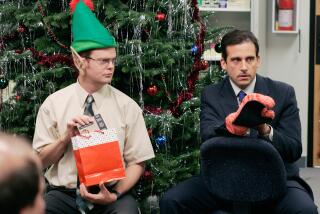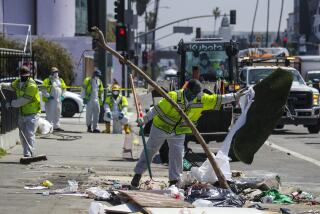A Toast to Those Who Must Sing ‘Auld Lang Syne’ at Work This Year
- Share via
Sure, the ball will drop. Confetti will pour from the sky. Champagne corks will pop. But tens of thousands of workers will have no fun whatsoever on New Year’s Eve, nor in the days before and after Dec. 31, as businesses from banks to utilities require extra staff to be on hand in case of computer outages or other troubles tied to the so-called Y2K bug.
The unlucky ones stuck working the panic shift--Dec. 30 to around Jan. 10--are in nearly every major industry, from travel to energy. But the most dramatic impact will be on workers at firms where a disruption of service could make the public a bit . . . nervous.
“When you’re the spokesman for a nuclear power plant and the millennium is coming, you pretty much know you’re working” the holiday, said Ray Golden, who happens to be the communications director for Southern California Edison’s San Onofre nuclear facility. Aside from its usual complement of workers, the plant plans to keep 30 extra employees on hand, mostly in its information technology section, from Dec. 31 through Jan. 4 on rotating 12-hour shifts.
Billions of dollars have been spent by government and industry to ward off the Y2K bug, a design quirk that could prevent computers and other controlling digital devices from recognizing ’00 as 2000 instead of 1900. Although the remedial work seems to have allayed most fears, many organizations are taking no chances.
To compensate workers who otherwise might be celebrating privately with their families, some companies have offered cash bonuses, free holidays, parties or even extra Internet access.
“As we move closer to the big event, there are going to be some very creative ways of rewarding employees,” said John A. Challenger, chief executive of an outplacement firm, Challenger, Gray & Christmas, and an expert on employment trends. Some may opt for extra days off in addition to overtime pay or may relax rules that forbid carrying vacation days into the next year, he said. “Some might say it’s hazardous-duty pay.”
AT&T;, the nation’s largest phone company, prohibited vacations between Dec. 15 and Jan. 15 for key people involved in the New Year’s preparations. Aside from hundreds of extra technical workers on hand to monitor its networks, the company will have service-resumption “SWAT teams” stationed at several centers around the country in the days before and after the rollover.
AT&T; Anticipates ‘a Boring Evening’
AT&T; spokesman Dave Johnson said most employees see the extra duty as a chance to be part of a “unique experience” and haven’t grumbled about missing out on parties or time off. AT&T; and other phone companies will provide catering in offices staffed through the celebration.
“We’re anticipating that it’s going to be a boring evening,” he said. “We want to make things as nice and festive as we can, and I suspect there will be many bottles of nonalcoholic champagne popped--but none of the real stuff.”
In fact, the company’s most anxious moments may actually come about 7 a.m. Eastern time on Dec. 31--when New Zealand, Fiji and the Marshall Islands become among the first locales to cross into 2000.
At Mountain View, Calif.-based Merant--maker of software solutions, including those for the Y2K glitch--
spokesman Keith Kohl said the company will provide cash bonuses and extra time off for a complement of workers that will beef up its customer-support operation starting Dec. 30 at 8 a.m. And the firm will lift its usual prohibition against recreational Web surfing.
While some technology companies are hiring bands and caterers or at least screening movies, others are making do with providing party hats and noisemakers and hoping they can let employees leave in the event of a nonevent.
“If we get into this thing three or four hours and nothing’s going on, we’ll send people home,” said Ron Porter, who heads a support center for network software company Novell Corp.
Officials at Cedars-Sinai Medical Center in Los Angeles expect the traditional jam of holiday and New Year’s cases, particularly in the emergency room, but have added employees to bulk up even their usual holiday shifts in anticipation of possible problems from the computer bug. Hourly workers will be paid holiday overtime, and salaried supervisors who work the New Year’s shift will be offered a free holiday later, said Vicki Clevenger, the hospital’s Y2K planning chairwoman.
“We’ve reminded people that calling in sick is strongly discouraged,” she said.
In the financial sector, many mutual funds are keeping staffers at the ready, not only for fear of snafus in their heavily computer-dependent operations, but out of concerns that some of their investments may plummet on Y2K disasters or that, closer to home, utilities and other logistics outside the funds’ control could go haywire.
At Vanguard, the Malvern, Pa.-based family of funds, hundreds of senior staffers will spend New Year’s Eve at two main command posts, “just to monitor how things are going,” said spokesman Brian Mattes.
Because Vanguard’s mainframe computers are cooled by water, tanker trucks of extra water will be standing by. The company has also arranged for 24 diesel generators for electricity and enough fuel to run them nonstop for weeks.
Bank of America plans to have an extra 500 workers on hand, in areas from information systems to marketing. About six months ago, the company told its consumer-banking unit in Los Angeles that, unless workers had already made plans, no vacations would be allowed in December or the first two weeks of January, a spokesman said.
Union Bank plans to have about 75 people working at a command post near its main data processing center in Monterey Park and has reserved hotel rooms for employees who require them through Jan. 2, spokeswoman Joanne Curran said. The command post will open Dec. 27 and will be staffed until at least Jan. 7, she said.
“For us, it will be one of those exercises of being on standby,” she said. “You’re sort of responding to the potential for hysteria.”
One of the few industries that actually plan to reduce staff for the New Year’s holiday is the airline business. Although bookings traditionally run light on certain holidays, airlines believe that some consumers are avoiding air travel for fear of midair failures.
Southwest Airlines plans to set up a hotline and provide data on its internal computer network for employees who are off but who want to keep tabs on how the company fares in the rollover.
American Airlines has canceled about 20% of its schedule on Dec. 31 and will adjust schedules of several ground crews to give them the holiday off, said spokesman John Hodart. Technical workers and administrators at the airline’s headquarters will be working, however, and were told to take their vacations early this year.
Field crews “will be home,” Hodart said. But “you’ve got others, including the [information technology] people, who’ve known for three or four or five years where they’re going to be.”
City of L.A. Plans at Least a 4-Day Vigil
Los Angeles officials said the city will pay holiday overtime to eligible employees who work Dec. 31 and, like many private firms, plans to coordinate its effort from a command center beginning at 6 a.m. Dec. 31 and running at least until the afternoon of Jan. 3.
Administrators at the city’s Information Technology Agency expect to have approximately 150 people working during the period, up from about 20 on a normal holiday weekend. The Department of Water and Power will have about 700 people stationed at its various facilities, a sharp increase over the 200 or so who normally would be working, said Frank Martinez, the city’s Y2K chief.
Martinez said food would probably be provided, and he hopes to begin releasing workers within hours after midnight if the rollover doesn’t appear to be affecting the city’s computer infrastructure.
“It is a work event for us, but certainly we don’t want to keep people here any longer than we have to,” he said. “As long as the infrastructure holds, we should be in good shape.”
Times staff writers Nancy Rivera Brooks and Elizabeth Douglass in Los Angeles and Joseph Menn in San Francisco contributed to this story.
More to Read
Inside the business of entertainment
The Wide Shot brings you news, analysis and insights on everything from streaming wars to production — and what it all means for the future.
You may occasionally receive promotional content from the Los Angeles Times.










